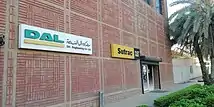DAL Group
DAL Group is a private Sudanese conglomerate and the largest company in the country.[2] It operates across several business sectors including food, engineering and agriculture.
| Formerly | Sudanese Tractor Company (SUTRAC) |
|---|---|
| Type | Privately held company |
| Founded |
|
| Headquarters | , |
Key people | Osama Daoud Abdellatif (CEO, Founder) |
Number of employees | 8200+ (2020)[1] |
| Divisions |
|


History
The DAL Group originated from the engineering company Sayer & Colley, founded in 1951 by two British partners when Sudan was under Anglo-Egyptian rule. Sayer & Colley later received Caterpillar's franchise for the country. In 1966, ten years after Sudan's independence, Caterpillar transferred the franchise to the Sudanese Tractor Company (SUTRAC) owned by Daoud Abdellatif, with Sayer & Colley retaining a minority share. Both companies were nationalized in 1970 then de-nationalized in 1971, although the government kept a minority share in both.[3]
Osama Daoud Abdellatif, Daoud Abdellatif's eldest son, joined SUTRAC in 1975 and became sales manager in 1978. After the government's share was bought out, he convinced his father to buy Sayer & Colley's share in 1979 and became CEO of SUTRAC the same year when Abdellatif became sick. Osama renamed the company DAL Engineering (his father's initials). DAL Agriculture was created soon after, leading to the creation of the DAL Group.[4] Several additional companies under the DAL name have been created since.
In response to the COVID-19 pandemic, DAL provided sanitization booths to the Ministry of Health in Khartoum.[5]
Business sectors
Agriculture
DAL Agriculture, founded in 1984, provides machinery and engineering services to Sudan's farmers. DAL Dairy Factory operates a dairy farm[6] and co-operates with USAID to provide impoverished school children in the Red Sea state with milk.
The DAL Group signed an agreement with the African Development Bank in March 2020, which provides a loan of up to $75 million to improve Sudan's food security and create more agricultural jobs.[7] In October 2020, DAL and United Arab Emirates-based IHC Food Holding agreed to invest $225 million over five years to develop 100,000 acres of farmland in Abu Hamad.[8]
Automotive
DAL Motors operates several franchises in Sudan, including Mitsubishi since 1994, Mercedes-Benz since 2006, and Kia. The company signed up to the United Nations Global Compact, but was delisted in April 2019 for failing to provide an annual report.[9]
Food
DAL Food is the largest company within the group by business volume and operates flour mills under its Sayga brand. It has also produced and distributed Coca-Cola for the Sudanese market since 2002 and has a factory for processing gum arabic for export.[10]
Others
DAL is involved in the education sector, having founded the Khartoum International Community School (KICS) in 2004. It also has a foothold in the mining, healthcare distribution and industrial gas industries.
Controversies
There is criticism within Sudan about subsidies given to companies involved in flour production and import, specifically Wheeta, Seen and DAL Food's Sayga brand. Although the subsidies are intended to keep prices down for consumers and manufacturers, the actual availability and quality of flour provided is a cause of concern.[11]
Some questions have been raised as to how DAL has been able to work with foreign companies (like Coca-Cola) despite US sanctions preventing them from operating in the country.[12]
See also
- Economy of Sudan
- List of companies based in Sudan
References
- Bank, African Development (10 March 2020). "Sudan: African Development Bank signs first private sector loan, DAL Group to receive up to $75 million". Banque africaine de développement - Bâtir aujourd'hui, une meilleure Afrique demain (in French). Retrieved 10 December 2020.
- Mann, Laura (June 2013). "'We do our bit in our own space': DAL Group and the development of a curiously Sudanese enclave economy". The Journal of Modern African Studies. 51 (2): 279–303. doi:10.1017/S0022278X13000207. ISSN 0022-278X. JSTOR 43303986. S2CID 154513426.
- "History | Dal Group". DAL Group. Retrieved 2 January 2021.
- "The man running one of Sudan's largest private companies". CNN. Retrieved 2 January 2021.
- "صحة الخرطوم تتسلم ممر تعقيم من شركة دال". صحيفة السوداني (in Arabic). 17 May 2020. Retrieved 10 December 2020.
- "Sudan's 'super cows' transform farms". BBC News. Retrieved 10 December 2020.
- Bank, African Development (10 March 2020). "Sudan: African Development Bank signs first private sector loan, DAL Group to receive up to $75 million". Banque africaine de développement - Bâtir aujourd'hui, une meilleure Afrique demain (in French). Retrieved 10 December 2020.
- "اقتصاد السودان: اتفاقية بين "العالمية القابضة" و"دال" لاستثمار 225 مليون دولار". العربية (in Arabic). 6 October 2020. Retrieved 10 December 2020.
- "DAL Motor Company Limited | UN Global Compact". UN Global Compact. Retrieved 2 January 2021.
- "Doing business in Sudan: DAL Group's innovative approach to growth". How We Made It In Africa. 24 August 2015. Retrieved 10 December 2020.
- Siddig, Khalid (23 June 2016). "Wheat imports subsidy in the Sudan: a waste of state funds, an oligopoly or a food security mechanism?". egyptssp.ifpri.info. Retrieved 10 December 2020.
- "US sanctions prohibit US companies from doing any business in Sudan, except in the Southern part. As a result, the two countries have no economic relations, except for a few exceptions that are allowed by the US administration: import of gum arabic for Coca Cola, and a large plant in Khartoum that is owned by the same company. US law does not prohibit from investing in foreign multinationals that operate in or sell to Sudan". Zoltán Vörös: China's role in Africa: The Case of Sudan. Tarrósy, István et al. (eds.), The African State in a Changing Global Context: Breakdowns and Transformations, p. 45. LIT Verlag Münster, Germany, 2011. ISBN 978-3-643-11060-2